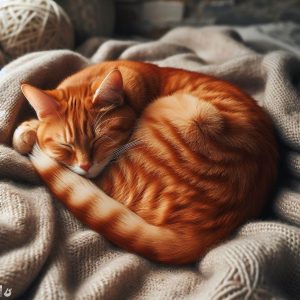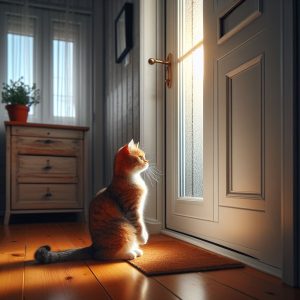“Meow, scratch, scratch”. You jolt awake at 2 AM to those dreaded sounds of your cat wailing outside your bedroom door. No matter how much you shush them away, your furry friend persists in the relentless noisemaking and scratching at the crack below.
As frustrating and sleep-depriving as this peculiar behavior may be, there are understandable reasons behind it. Cats thrive on predictability and routine. So when you suddenly shut them out of a room they regularly access, it can provoke intense anxiety, curiosity and neediness.
In this guide, we will dive deep into the top theories behind why cats wait outside closed doors and provide actionable tips to curb this irksome behavior.
Whether your feline is stressed, bored, hungry or just craving quality time, we’ve got you covered. Read on to finally decode the curious case of the cat outside your door, and learn proven strategies to restore blissful, uninterrupted sleep!
Reasons Why Cats Wait Outside Bedroom Doors
The first step to stopping any undesirable cat behavior is understanding the root motivations behind it. Here are the most common theories explaining why your cat waits persistently outside your closed bedroom door:
1. Separation Anxiety
Cats are inherently social creatures who become strongly attached to their human and feline families. They thrive on affection, routines and familiar environments.
So when you suddenly shut them out of a room they regularly access, it can trigger intense separation anxiety and a fear of abandonment. Your cat waits outside the door because:
- They are stressed over the disruption to their daily routine – Cats are creatures of habit who depend on set schedules of eating, playing, napping and bonding. Changing this familiar structure confuses and upsets them.
- They feel anxious being excluded from their territory – Your bedroom is part of your cat’s instinctual home turf that they have scented and feel ownership over. Locking them out makes them nervous that you are abandoning them.
- They desire your reassuring presence – As social animals, cats need reminders that their human caretakers are near. Being shut off from you provokes a distressed response.
Try to maintain consistency in their daily feed/play/sleep cycles. Limit closing bedroom doors and increase overall lap time and affection. A confident cat who trusts your returning presence will feel less need to wait anxiously outside the door.
2. Boredom & Inactivity
Your cat was once a magnificent predator, and still retains those innate hunting instincts! An energetic and playful cat who is left alone for too long can get bored, restless and crave stimulation.
Incessant meowing and scratching at your door is their way of demanding entertainment and interaction from you. Causes of boredom-induced door waiting include:
- Lack of toys & insufficient playtime – Cats need active play sessions, preferably involving interactive wands, treat balls and catnip toys that challenge their prey drive. Without enough physical and mental stimulation, they get antsy.
- Excess energy and hunting needs – Underexercised cats, especially active young ones under 2 years, have pent up energy and predatory instincts that require an outlet. Insufficient activity leads to acting out.
- No other pets at home – Lonely cats rely solely on humans for entertainment. With no feline playmates or distractions, they grow needier for attention.
Remedy boredom by scheduling regular 15-minute play sessions through the day using fishing rod toys. Leave out puzzle feeders stuffed with treats when away. Having another pet also reduces demands for your time and interaction.
3. Disrupted Sleep Cycle
Cats are known for sleeping nearly 16 hours a day in short bursts. They tend to be most active at dawn and dusk – just like their wild ancestors!
Over time, your cat becomes accustomed to your own sleep habits and rhythms. When you alter your bedtime routine suddenly, it can throw off their body clock and cause confusion. Reasons include:
- You went to bed early or slept in late – Straying from the usual lights out time disorients cats who expect your cycles to align.
- You forgot to play/feed them before bed – Missing their pre-slumber routine of playtime and dinner interrupts their schedule.
- You’re waking up later than normal – Cat breakfast time got delayed, creating impatience.
Try sticking to the same timed routine for feeding, playing, then a pre-bedtime snack. Be consistent with when you turn in too – feline bodies acclimate to your sleep/wake rhythms.
4. Hunger Pangs
The meowing, pacing and attempts to wake you may simply come down to your cat demanding an early breakfast!
When cats get hungry in the wee hours but can’t access food, they will be sure to notify you of their displeasure. Reasons include:
- Irregular feeding times – When dinner and breakfast happen at odd hours instead of set times, it can confuse their body clock and spur hunger pangs at night.
- Too long between meals – Kittens and senior cats need more frequent small meals. Waiting 8+ hours between dinner and breakfast leaves them ravenous.
- Sudden change in diet – A new food can alter digestion patterns and leave them hungry sooner.
- Shortage of food or water – Empty bowls overnight cause impatient meowing for refills at first light. Cats hate having resources restricted.
Try an automated feeder to dispense meals at scheduled times. Keep water bowls topped off. And leave dry kibble available overnight – this curbs the early morning pleas for food!
5. Craving Playtime & Affection
Sometimes your cat simply stays outside the door because they miss you and crave quality bonding time!
When you retreat for the night, your sociable kitty feels upset that their favorite human is suddenly inaccessible and not providing the attention they need. Reasons include:
- They’re feeling ignored – Being shut out makes cats feel deprived of their usual time with you.
- They want play and affection – Lack of daytime interaction leaves them craving more engagement at night.
- They miss sleeping near you – Cats feel most secure snoozing close to their guardians.
Make sure to play, brush, and cuddle your cat sufficiently during the day. Leave out novel toys at night and let them sleep nearby or outside your room if possible. This prevents them from growing needy.
6. Medical Reasons
Sometimes frequent meowing, clinginess and waiting can result from pain or illness requiring veterinary attention:
- Urinary tract infection – Excessive meowing and door scratching may signal UTI pain and frequent urination needs.
- Hyperthyroidism – This condition causes neediness, vocalizing and insatiable hunger from a sped up metabolism.
- Cognitive dysfunction – Senior cats can develop feline dementia leading to needy behavior, especially at night.
- Arthritis – Joint pain can make moving difficult, causing them to vocalize for help accessing litter boxes, food, and you.
Schedule a vet visit if door-scratching increases along with other symptoms like appetite/thirst changes, inappropriate urination or weight loss. Better to be safe and rule out medical issues!
7. Startled by Night Noises
Cats have extremely sensitive hearing, and sudden sounds can unsettle them, especially during their nocturnal wanderings.
Your bedroom likely seems like the ultimate safe zone. When they hear worrying noises like loud TVs, appliances or even passing cars outside, their instinct is to seek safety and comfort with you at the door.
Try leaving a fan or white noise machine running to mask disturbing nighttime sounds. Also ensure your cat has some cozy hiding spots around the house that make them feel secure.
Tips to Stop Cat Waiting Outside Doors
Now that we’ve explored the likely motivations behind this common feline behavior, here are some useful methods to curb door waiting and midnight meowing:
1. Enrich Their Environment
An enriched home environment relieves cat boredom and anxiety. Make sure to provide:
- Cat trees/perches – These allow them to climb, scratch and survey their territory from a high vantage point.
- Hidey-holes – Cardboard boxes, tunnels and cozy cat beds give them safe spaces to retreat.
- Toys – Rotate novel toys frequently to pique their interest. Include wand toys, treat balls and catnip.
- Scratching posts – These satisfy scratching instincts while protecting your furniture. Use catnip spray to attract them.
- Window perches – Let them observe outdoor stimuli and chirp at birds!
A content cat in an enriched home is less likely to bother you out of restlessness or insecurity.
2. Increase Daily Exercise & Play
Make sure your cat gets sufficient exercise and playtime during daylight hours.
Interactive wand toys that tap into their prey drive are ideal. Drag toy mice, feathers and strings around to simulate hunting. Laser pointers work too.
Dedicate 15-minute play sessions 1-2 times daily to really tire them out. Work up a sweat and end each session by letting them mock “kill” the toy. You want them pleasantly pooped!
This reduces boredom and excitable energy that can lead to acting out at night. A tired cat is a happy, well-behaved cat!
3. Provide Puzzle Toys and Dispensers
Mental stimulation is just as important as physical play for cats!
When you’re away, provide toys and feeders that challenge their clever brains and keep them productively occupied, like:
- Puzzle feeders – Food is dispensed as cats bat and roll balls. Great for wet food too.
- Treat balls – Kibble or treats fall out as the ball is batted around. Chase and “hunt” time!
- Interactive food dispensers – These have sliders, hiding spots and challenges they must solve to access treats.
- Catnip toys – Any toy stuffed with this fragrant herb will fascinate them for hours as they roll, kick and play.
These provide mental exercise to complement physical activity. A mind enriched with stimulating play is less prone to boredom and mischief!
4. Set a Predictable Routine
Cats depend on predictable routines for feeding, playing, sleeping and human interaction. When this schedule gets disrupted, it creates confusion and stress.
Try sticking to a regular timed agenda for your cat’s daily activities. For example:
- 7 AM – Breakfast
- 9 AM – Morning play and cuddling session
- 12 PM – Lunch
- 3 PM – Afternoon playtime with toys
- 6 PM – Dinner
- 9 PM – Catnip and pre-bed play session
- 10 PM – Lights out!
Maintaining consistency in this day plan minimizes anxiety when you suddenly close them off at bedtime. Your cat will trust that normal cycles will resume in morning.
5. Give Them Pre-Bedtime Affection
Before you turn in for the night, be sure to spend 15-20 minutes actively playing with, petting and feeding your cat.
Engage them with wands and treat puzzles to tire them out. Give soothing brushes along their back and chin scratches. Set out a bowl of food or chewy treats as well.
This nighttime routine prevents anxiety over being separated all night. They’ll be more relaxed and less inclined to call for you.
6. Leave Bedroom Doors Open
The simplest solution if feasible – stop closing them off entirely! Allowing free access to your bedroom removes the stress of being separated.
Maintaining their usual environment prevents reactions to the sudden loss of territory. It also allows them to sleep closeby as they prefer.
If possible, just let them doze at the foot of the bed or place a cozy cat bed in your room. Their primal need to be near you at night is satisfied.
7. Give Them a Midnight Snack
For cats prone to early morning hunger meows, set out an automatic timed feeder to dispense a portion of wet food around 3-4 AM.
This prevents those desperate pleas for breakfast the moment dawn breaks! They’ll nibble their snack and return to sleep. Look for feeders with ice packs to keep food fresh until morning.
You can also free feed dry kibble overnight. Just monitor intake and adjust meal portions accordingly. Keeping their bellies content is key.
8. Use Pheromone Diffusers
Plug-in pheromone diffusers release synthetic cat facial pheromones into the air. This chemical message has a soothing, relaxing effect that relieves stress.
Place a diffuser near your bedroom door to help curb anxious meowing and scratching. It mimics those “don’t worry” signals from feline facial glands.
These calming pheromones promote security. Used along with consistent routines and affection, they can minimize acting out.
9. Reward Calm Behavior
If your cat settles down quietly outside the door, reward them the next morning with petting and treats. But ignore scratching or crying – even negative attention is attention!
With time, they will associate sitting calmly outside your room with praise, and learn their pesky behavior doesn’t successfully summon you. Consistency here is key, however. You have to out-stubborn your cat!
10. Use Aversives Outside Door
Placing unpleasant textures or scents by the door can deter scratching and waiting. For example:
- Aluminum foil or sticky shelf liner – The texture under their paws is irritating.
- Upside-down vinyl carpet runner – The knobs make it uncomfortable to stand there.
- Citrus scents – Cats dislike zesty odors. Try lemon or orange peels.
- Perfume, air fresheners or essential oil scents – Anything overly fragrant repels them.
- Pet repellant spray – Look for non-toxic formulas made to curb pet misbehavior.
Avoid methods that could scare them or impede movement – you want to just make the area unappealing. Test sprays on a small area first too.
11. Provide Ambient Noise
Try leaving calming background noise on at low volume to soothe cats overnight. The sound masks any startling noises like passing cars or TVs.
Options include:
- Radio static – A consistent waterfall of white noise is soothing.
- Nature sounds apps – Crickets, rain, forest sounds lull them.
- Calming cat music – Look for special “music for cats” playlists and videos.
- Fan or air purifier – Soft whirring provides consistent ambient noise.
This reassures anxious cats prone to picking up every little nighttime sound when senses are alert. Masking noises prevents freak-outs.
12. Rule Out Medical Issues
In senior cats, medical issues like hyperthyroidism, arthritis and cognitive dysfunction are linked to excessive vocalization, clinginess and neediness.
Schedule a check-up if door-waiting is accompanied by:
- Changes in water/food intake
- Weight loss
- House soiling
- Hiding more
Better to be safe and rule out illness before dismissing it as behavioral. Treatment can help manage conditions and improve comfort.
13. Get a 2nd Cat
A bonded companion provides play, cuddling and distraction from humans!
Introduce a second cat slowly and properly. But once they are friends, they will entertain each other, reducing boredom and demands on you.
Just ensure the newcomer doesn’t pick up door-waiting habits too! And that your cat accepts the new arrival – do it gradually if they seem uneasy.
14. Use Baby Gates
If closing doors entirely is unworkable, install adjustable metal baby gates instead to cordon off rooms.
They allow air flow and partial entry but deter full access. Your cat can see and smell inside but not disrupt your sleep.
Look for tall, hardware-mounted adjustable gates. Make sure your cat cannot jump or squeeze over too! Gates work well for door dashers.
15. Play Cat-Specific Music
Some classical music is proven to have a soothing neurological effect on cats.
Try leaving a specialized “music for cats” playlist on a low volume near problem areas. Songs use tones and tempos that appeal to feline ears.
Look online for cat-specific music videos or channels. It may sound odd but it can have genuine relaxing benefits!
16. Use a Thundershirt
These snug-fitting calming shirts apply gentle pressure which has an anxiety-relieving effect on cats.
Have your cat wear one at night – it makes them feel secure, like being held. This can reduce vocalizing and restless behavior.
Measure carefully for a good fit. But don’t force it on truly distressed cats. Use in conjunction with other methods.
17. Clean Soiled Door Areas
Cats are drawn back to areas they’ve urine-marked or soiled. Eliminate any lingering odors which can attract repeat visits.
Use an enzyme cleaner and/or blacklight to identify all problem spots. Soak thoroughly, let sit, and rinse away. This removes the “call of the void!”
When to See the Vet About Meowing & Waiting
Though usually behavioral, increased vocalizing and clinginess can sometimes indicate medical problems requiring veterinary attention. Seek the vet’s advice if your cat shows these symptoms along with the door-waiting behavior:
- Signs of pain like limping or vocalizing when touched
- Major changes in water consumption, urination or appetite
- Significant weight loss or gain
- Excessive vomiting or diarrhea
- Confusion, forgetfulness or litter box issues
Senior cats warrant closer monitoring as hyperthyroidism, arthritis, kidney disease and cognitive decline set in with age. Always better to rule out illness rather than assume they’re just acting out for attention. Your vet can provide treatment or medication to improve any discomfort or anxiety.
Conclusion
In the end, cats wait outside our doors because they are complex creatures of habit who hate uncertainty and change. Disrupting their routine, denying them affection, or shutting them off from their usual environment breeds stress, boredom and neediness. But with the right enrichment tools and training, you can curb annoying meowing and sleep soundly!
The key is understanding your cat’s motives and making sure their needs for food, play and company are met, especially during the day. Providing puzzle toys, cat towers, and set mealtimes also prevents acting out. While patience and consistency are required, your efforts will be rewarded with a happy, calm kitty at night!
So next time your cat cries at your door, don’t despair. With this comprehensive guide, you can finally decode the mystery behind this vexing behavior and restore peace to your bedroom. Sweet dreams for both you and kitty!



